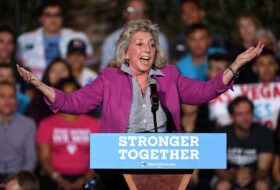
The National Council of Legislators from Gaming States (NCLGS) will form a committee to draft model gambling legislation to assist states considering gambling expansion, focusing first on online casinos.
On Jan. 4, the coalition of state lawmakers announced that public hearings with industry stakeholders will kick off soon, possibly as early as March.
Ideally, the group plans to share the model online casino legislation in July at its summer meeting.
NCLGS president Shawn Fluharty of West Virginia’s House of Delegates addressed the effort during the NCLGS’ annual winter meeting in Fort Lauderdale in early January.
Obviously, iGaming is the talk of the town right now. Director Rebuck touched on it. On how it’s been slow-moving in states compared to sports betting. And what we want to do at NCLGS is help policymakers and regulators who come to our conferences take something back with them, and what we want to take back is good policy.
NCLGS President Shawn Fluharty @WVUFLU just announced at today’s meeting, that a new committee is being created by NCLGS to help policymakers & stakeholders focus on igaming regulation. The group will help with the organization & implementation process. #NCLGS pic.twitter.com/3PeIkOvV0t
— NCLGS (@NCLGS) January 4, 2024
Model Legislation will Provide Starting Point
As reported by Vixio, Fluharty also said stakeholders will include West Virginia University academics, law firms, and independent consultancies.
We’re going to put some model legislation together so that legislators like yourselves, and those who will be listening in, can take some feedback back to your district and put together good legislation that’s going to raise revenue and not taxes.
Fluharty added that improving consumer protection and transparency are goals.
David Rebuck, director of the New Jersey Division of Gaming Enforcement (NJDGE), also shared his two cents in the same report.
According to Rebuck, three primary considerations are at play when states weigh legalizing online casino gaming.
- Who will serve as market gatekeepers?
- The number of skins allowed for each operator
- State tax policy (including rate and intended use)
Internet gaming, Rebuck said, is concerning to people because they want to know if it will be an expansion similar to the online sports wagering tsunami.
He added:
Those three key policy decisions, they’re going to pretty much drive the legislature’s determination on other things. But those three are the ones you’re going to have the most input from stakeholders who have an opinion.
Online Casinos Lack Familiarity
The slow and, to some, disappointing pace of US online casino expansion indicates a lack of momentum, unlike with sports betting.
Executive director Darren Dorsey of the Association of Gaming Equipment Managers (AGEM) told Vixio that sports betting offers a familiarity that taking casinos online doesn’t.
I think [with] sports betting, people are familiar and had an affinity for it; they were doing it in some form or fashion, even if it’s you and I bet for a beer watching the game. That activity is ingrained. We’re comfortable with that versus the technology of taking a land-based environment and turning it into a digital environment.
In turn, Martin Lycka, senior vice president of American regulatory affairs and responsible gaming for Entain, said that online casinos lack the “robust narrative” that has fueled the push for sports betting. In particular, he noted the momentum created by 2019’s PASPA repeal.
Lycka argued it’s up to the industry to tell a similarly compelling story.
I would suggest that it’s up to us as an industry and everybody else involved in this space and ecosystem to create the narrative and build on addressing the potential concerns around responsible gambling.
Alex Weldon, the editor here at Bonus, noted the idea of model legislation isn’t new.
The problem of regulatory inconsistency isn’t new. I recall from 2021 a discussion led by Richard Schuetz, Dr. Katherine Spilde, and Steven Myers at the CasinoBeats Summit about this very issue. They framed it as an existential crisis for the industry, a choice between chaos and sustainability.
Their proposed solution, which I support, was for a network of “Gaming Knowledge Centers (GKCs)” that would bring together regulators, academics, and industry figures to establish best practices and draft templates for states to follow.
I think this effort by the NCLGS is very much in that spirit. I’m glad to see that they’re taking input from a variety of sources and can’t wait to see what the recommendations look like this summer.





